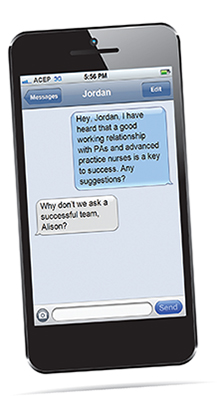
Explore This Issue
ACEP Now: Vol 34 – No 09 – September 2015Alison L. Smith, MD, MPH, is a resident in the emergency department at the University of Utah in Salt Lake City. Jordan Celeste, MD, is president of the Emergency Medicine Residents’ Association and an emergency physician in Florida.
The relationship between a physician and a physician assistant (PA) is unquestionably valuable to the patients they treat and the departments they work in, and it can be critical to the delivery of excellent emergency medical care. It is, however, a relationship that is developed and refined with time and effort by both practitioners. The best way to describe that relationship is teamwork. Lynn Scherer, MS, PA-C, and Maria Halluska-Handy, MD, have been teammates at Einstein Medical Center Elkins Park in Elkins Park, Pennsylvania, for 13 years and describe how this great relationship was developed and is maintained. Ms. Scherer is the EM physician assistant residency program director, and Dr. Halluska-Handy is medical director of the PA residency program and assistant residency director for the EM physician residency training program.
Ms. Scherer: I had already been a practicing emergency medicine PA when I first met Dr. Handy, who had recently completed her residency and came to work at our institution.
I have found through my years of practice that physicians often arrive at a hospital never having worked with PAs and are unclear how their roles are synergistic and what expectations should exist. For me personally, I find the greatest asset to developing a great working relationship with a physician is trust. A physician may not know the level of my medical knowledge, typically has concerns if I know what I don’t know, or may or may not be sure what the supervisory requirements are as they differ in every state and often from site to site.
Upon meeting Dr. Handy, we discussed my training and experience and the supervisory requirements, and I presented all patients to her until she felt comfortable with my medical knowledge and diagnostic approach. This is the foundation on which our team rapport was built. Because of our close working relationship, this process is now typically brief.
Over the years, we have learned to work synergistically to care for patients with varying diagnoses, from simple ankle sprains to more acutely illnesses. In every scenario, I trust that the physician I am working alongside is always available to discuss a complicated clinical presentation or to offer additional expertise. We are colleagues working together as a team, based on trust, to better care for the patients we see every day.
Dr. Halluska-Handy: A great relationship between a physician and a PA is developed and maintained through good communication, respect, trust, and humor. It starts on the very first day you work together. It is important that both the physician and PA know where the other is coming from, what their prior experience is, and to set the parameters for how they will work together.
When I work with PAs for the first time, I try to get to know them a little bit and find out about their prior clinical experience and their comfort level for different types of cases. Depending upon their level of experience, I let them know up front that for the first couple of shifts together, I will want to hear about and see many of their patients. This is a critical step in developing a basis for trust and performing a certain amount of due diligence.
Once I am comfortable with their level of clinical skill and judgment, I let PAs know that I am happy to hear about any case they wish to discuss and that I very much value their ability to know when to involve me in a case. Always keeping the lines of communication open between the physician and PAs is crucial. I let them know that I am always available for questions and that I will never be upset to be asked to see a patient, whether it is a case of diagnostic uncertainty or a patient-satisfaction issue.
In my practice environment, if PAs were not there, it would simply mean many more patients I would be required to see independently. Working with PAs means the patients are getting better care because they are being seen more expeditiously, getting more time with the provider, and, in some cases, getting the benefit of two providers’ clinical assessments.
A great working relationship means that the expectations have been clearly expressed, that the respect for the PAs’ level of education and clinical skills allows the physician to trust PAs in acknowledging what they know and don’t know, and to be able communicate without hesitation when they need physician involvement and support.
Lynn Scherer is the EM physician assistant residency program director at Einstein Medical Center Elkins Park and President of the Society of Emergency Medicine Physician Assistants.
Dr. Halluska-Handy is medical director of the PA residency program and assistant residency director for the EM physician residency training program at Einstein Medical Center Elkins Park.
Pages: 1 2 3 | Multi-Page




No Responses to “Tips for Collaborating with Advanced Practice Providers”